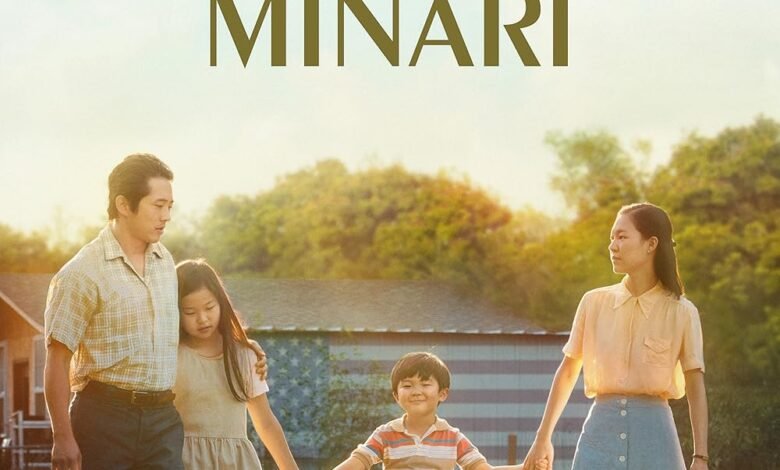Movie Review for the Week: “Minari”(2020) — Finding Home: A Tender Portrait of Family, Hope, and Resilience

Directed by: Lee Isaac Chung
Starring: Steven Yeun, Han Ye-ri, Alan Kim, Noel Kate Cho, Youn Yuh-jung, Will Patton
Languages: Korean and English
Country: USA (Korean-American production)
Introduction
Minari is not just a film about immigrants, it is a poignant meditation on what it truly means to find a home. Rooted in the semi-autobiographical childhood memories of writer-director Lee Isaac Chung, this quietly powerful drama follows a Korean-American family in the 1980s as they leave behind the familiarity of California to start anew on a farm in rural Arkansas.
On the surface, Minari is about growing crops, building a business, and navigating the cultural dissonance of immigrant life. But at its core, it is about planting roots, not only in the soil, but in each other. It is a tender story of love, loss, hope, and resilience, told through the wide eyes of a young boy, David, as he watches his parents struggle to build a future and his grandmother sow seeds of heritage and hope.
Plot Overview
Jacob Yi is a man of fierce ambition. Convinced the Arkansas soil is fertile enough to grow Korean vegetables for a growing diaspora market, he uproots his family from urban California to a small trailer home perched on cinderblocks in the middle of the Ozarks. His wife, Monica, is deeply skeptical. The place feels isolated, fragile, far from hospitals and friends, especially for their young son David, who has a heart condition.
As Jacob spends long days trying to coax life from the land, the marriage strains. Monica longs for stability and support; Jacob wants to prove his worth, especially to his children. Their daughter Anne watches quietly as tension simmers between her parents. Into this fragile household arrives Soon-ja, Monica’s irreverent, loving, and foul-mouthed mother from Korea. To the Americanized David, she is not a “real grandma “she smells of Korea, can’t bake, and curses during card games. Yet Soon-ja becomes the heart of the home, planting minari seeds by a nearby creek, nurturing the children’s spirits, and gently challenging David to see his own strength.
Disaster looms, Jacob’s well dries up, his produce orders collapse, and Soon-ja suffers a debilitating stroke. Yet through heartbreak, fire, and loss, the Yi family comes to understand that home is not built on land, water, or crops, it is built on love, persistence, and the willingness to stay and buid a home together.
The Immigrant Experience: Hope and Dislocation
Minari captures the emotional duality of immigration. The dream of better opportunities paired with the pain of dislocation. Jacob sees the land as possibility; Monica sees it as exile. The film avoids clichés of dramatic culture clashes and instead shows the slow, intimate unraveling and rebuilding of a family’s inner world as they struggle to belong.
Intergenerational Bonds
Soon-ja’s arrival reframes the story. She embodies resilience, humor, and cultural memory. Her planting of minari, an unassuming Korean herb known for growing anywhere, symbolizes heritage taking root in foreign soil. Through her bond with David, she passes on not just language and customs, but emotional courage.
Childhood, Fear, and Freedom
Seen through David’s eyes, the world is both wondrous and fragile. His heart condition makes him anxious, but Soon-ja’s playful irreverence frees him from fear. The film gently affirms that children flourish when love releases them from the weight of adult anxieties and when they feel trusted to be strong.
The Meaning of Home
Ultimately, Minari shows that home is not a physical structure or even stability, it is a decision to love and stay, even when things fall apart. The family’s choice to remain, to dig a new well, and to harvest the resilient minari mirrors their own rebirth.
Why It Matters for Families
Minari is a gentle, profound reminder for parents and children alike that:
- Dreams matter, but people matter more.
- Roots can be planted anywhere when nurtured with love.
- Heritage is not a burden, it is a gift that strengthens children’s identity.
- Resilience grows in the soil of supportive relationships, not success alone.
It is an especially powerful watch for families navigating transitions, migration, cultural identity shifts, or the pressures of achievement.
Conclusion
With its quiet grace and emotional honesty, Minari stands as a luminous proof to the resilience of families striving to build a home. It does not glorify suffering nor romanticize struggle; instead, it celebrates the everyday courage of loving each other through uncertainty.





